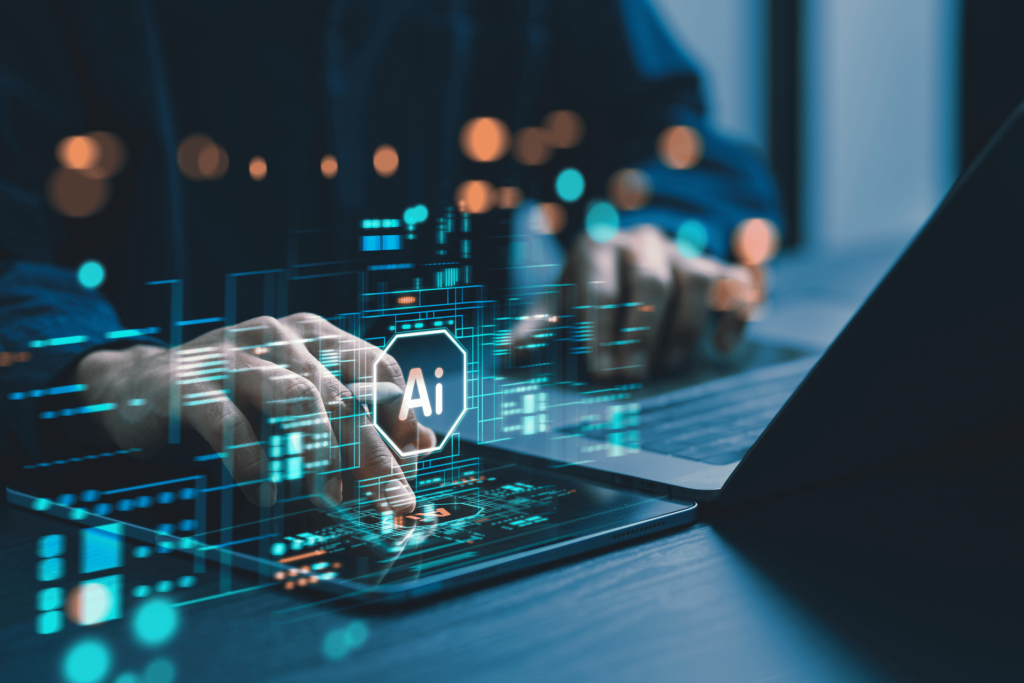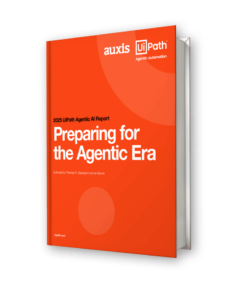In brief:
- Agentic AI holds the potential to transform the way we work, with global spending jumping from $0 to $400 million in a year and expected to grow 10-fold by 2028.
- While traditional automation like RPA focuses on automating repetitive, rule-based tasks, Agentic AI gives automation an unprecedented ability to perceive its environment, reason and ask questions, recognize patterns, plan and execute actions, and continuously evolve to enhance its performance.
- Agentic automation has applications across industries, performing processes previously beyond the reach of automation like writing software code, processing claims and invoices end to end, predicting employee turnover, and solving complex customer issues.
- Amid the AI skills gap, finding high-quality resources with the skills to build AI agents is a front-and-center concern, with six critical requirements spanning technical and business expertise integral to success.
The evolution of business process automation in the last few years has been nothing short of extraordinary. The shift from simple rules-based workflows to intelligent, adaptive systems capable of handling complex tasks has been made possible largely through the rapid advancements in artificial intelligence (AI) technology.
Agentic AI is the latest AI breakthrough – and potentially the most game-changing. Heralded as “Act Two” of automation technology, it empowers advanced software robots, or agents, with the ability to independently learn, make decisions, and act with minimal human supervision – transforming how businesses approach problem-solving and process optimization.
The technology has found rapid uptake: IDC reported that global spending on Agentic AI went from $0 in 2023 to almost $400 million in 2024 and is expected to grow 10-fold by 2028 to over $4 billion.
But here’s the thing: most businesses are still trying to get the initial steps of their AI journey right, attempting to realize expected value from Generative AI (GenAI) and Specialized AI like Intelligent Document Processing. Agentic takes AI’s capabilities to a whole new level. And like any new technology, questions swirl around the true opportunities and challenges it brings – and what the dawning of the agentic era really means for a business.
With extraordinary recognition as a Platinum Partner and Foundational Partner of the Year for the Americas for UiPath, the world’s leading AI and automation platform, Auxis stands at the forefront of tech innovation with early access and proven success with emerging technology. This blog offers our perspective on the real benefits and practical use cases for Agentic AI – and what you need to start a journey that maximizes business outcomes and ROI at scale.
Agentic AI 101: Bridging the gaps in AI and automation
Agentic AI combines multiple advanced AI models and technologies – including large language models (LLMs), machine learning algorithms, deep learning, and reinforcement learning – to empower a new breed of autonomous software agents with extremely high levels of cognitive skills. Enter the era of problem-solving machines suitable for dynamic work environments.
This is transformational for automation. A far cry from the rules-based limitations of Robotic Process Automation (RPA), Agentic AI stretches the limits of what’s possible – enabling agents to perceive their environment, reason and ask questions, recognize patterns, plan and execute actions, and continuously adapt and evolve to enhance their performance.
Robots and agents are deployed together to understand, improve, and automate processes from start to finish: RPA for automating rules-based tasks, and agents to complete complex business processes that were previously beyond the reach of automation, due to the agents’ unprecedented ability to act independently, adapt to changes, and make informed decisions.
Human-in-the-loop (HITL) requirements are minimized but never eliminated. Agentic AI agents are intentionally limited in their ability to take certain actions (for example, approving a home loan), ensuring humans stay in control of strategic decision-making and oversight.
Agentic AI also resolves some of the greatest challenges companies face with current AI technologies, including a lack of integration with other business applications and an inability to learn and adapt without human intervention. It also reduces the risk of inaccurate results or hallucinations through built-in feedback loops and adaptive learning mechanisms.
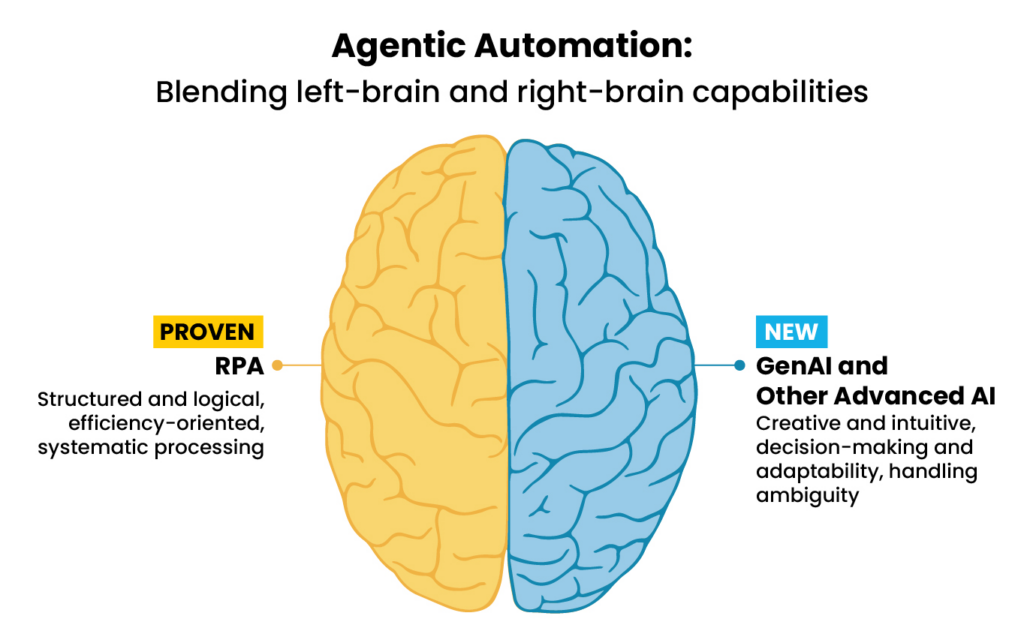
In the 2025 UiPath Agentic AI Research Report, 90% of business leaders said they had processes that could be improved by Agentic AI. The biggest benefits expected include:
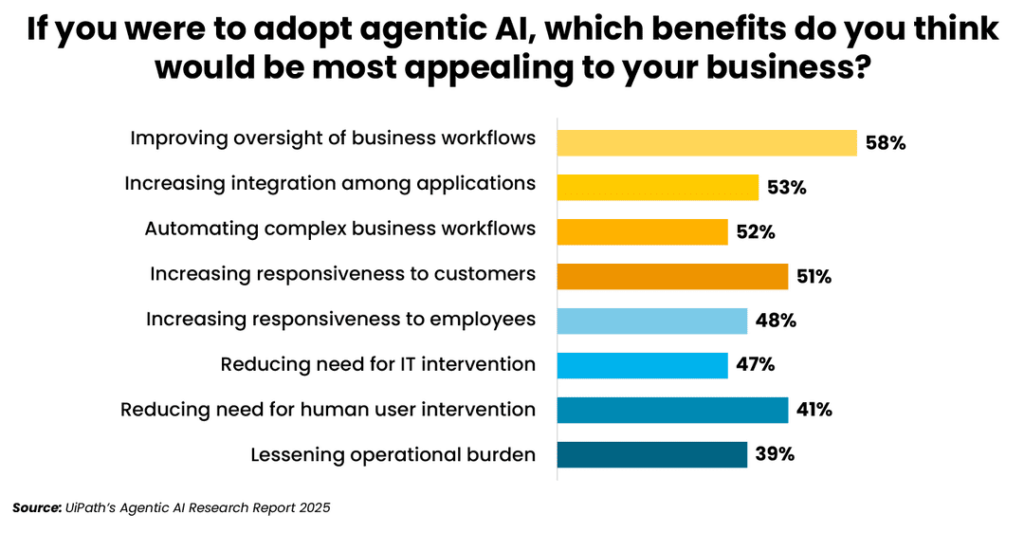
6 early use cases that unlock the potential of Agentic AI
Agentic automation has broad applications across industries and business processes. Below are just some of the early AI agent use cases and Agentic AI examples identified for this emerging tech by UiPath and other intelligent automation providers:

1. Accounts payable
Agentic automation can infuse unmatched efficiency and accuracy into accounts payable processes. Agentic AI examples include workflows for intelligent document processing that significantly streamline management of unstructured documents – breaking down tasks into specific components handled by multiple agents to navigate intricate activities ranging from data extraction to calculation and verification.
Agents can aid in dispute resolution by handling the time-consuming process of reviewing information such as policy documents, allowed exceptions and replacements, etc. – summarizing key findings and recommendations. Agents can also communicate with suppliers to gather missing information, clarify discrepancies, etc.
This UiPath chart demonstrates how an AP agentic workflow could function:
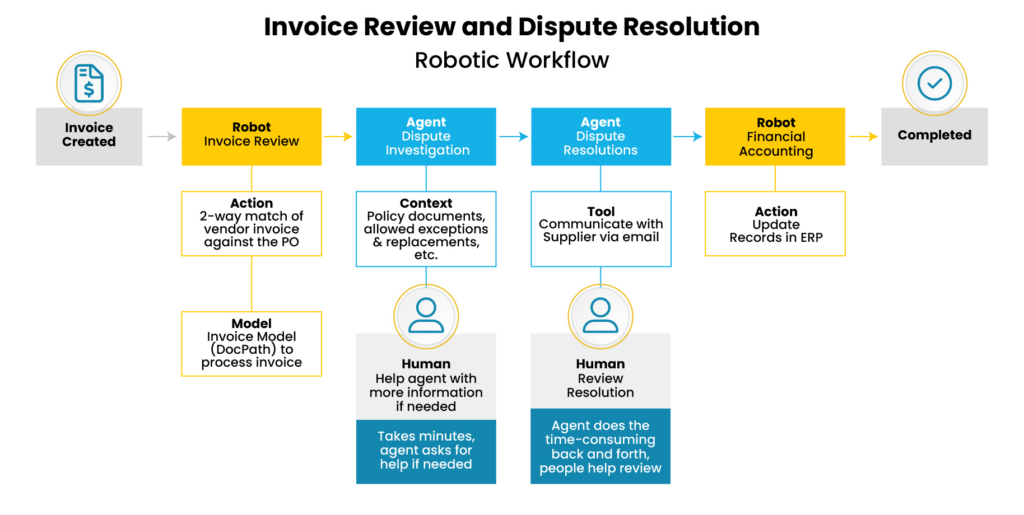

2. Customer support
Agentic AI and automation can elevate customer experience, powering personalized recommendations and 24/7 support. Sentiment analysis tools can gauge customer feedback in real time, allowing businesses to respond proactively, refine their offerings, and deliver personalized experiences that improve customer satisfaction and build loyalty.
Agents can also understand oral and written customer inquiries, resolve complex issues, and even anticipate customer needs, providing more tailored and proactive experiences.

3. Healthcare revenue cycle management
In an area rife with tedious and time-consuming processes, agentic can alleviate significant pain points for revenue cycle management teams. For example, Agentic AI can automate claims submissions with real-time validation, reducing errors and rejections through self-correcting AI models that detect missing or inaccurate data before submission. It can then direct robots to gather necessary information from various sources, and even leverage Generative AI models to create knowledgeable and empathetic communications with patients.
Agentic AI can analyze historical claims data to identify patterns that lead to denials, proactively flagging high-risk claims and recommending corrective actions before submission. It can also instantly check insurance and benefits to automate prior authorization and eligibility verification, while leveraging conversational AI agents to interact with payers and expedite approvals.

4. IT operations
Agentic AI can help IT staff focus on high-value and strategic work, offering the ability to troubleshoot non-standard IT issues, detect system failures and apply fixes, anticipate failures and schedule maintenance proactively, recommend improvements to IT infrastructure and service delivery, and more. It can also enhance cybersecurity with advanced threat detection and protection; for example, isolating affected systems, applying countermeasures when a threat is detected, and enhancing automated monitoring of network traffic and user behavior for suspicious activities.
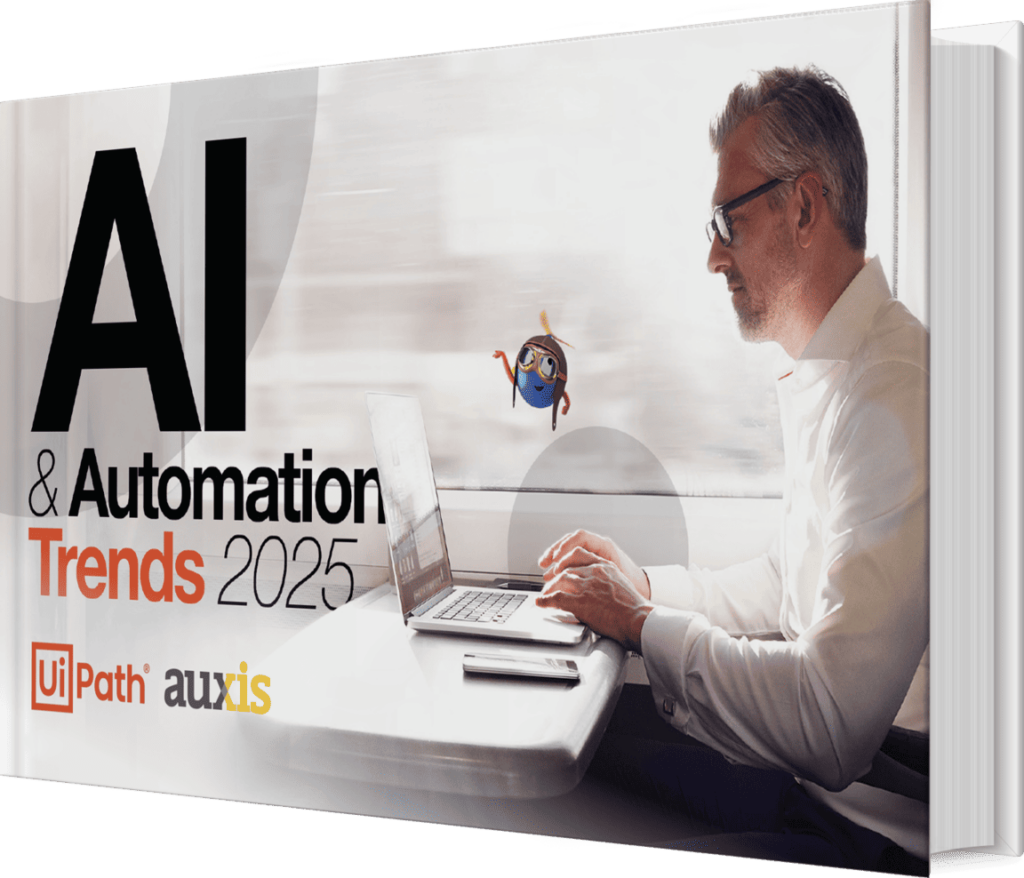

5. Human resources
As HR struggles to keep pace with an overwhelming number of daily duties, Agentic AI opens the door to unparalleled automation possibilities. Agentic AI-powered chatbots can conduct initial candidate screenings, answer questions, and schedule interviews, while predictive analytics forecast candidate success and turnover risks based on historical data.
With employee experience a top priority in a tight job market, intelligent virtual assistants can answer employees’ HR questions in real time, provide sentiment analysis of employee feedback to detect trends in engagement and morale, and even offer proactive burnout detection.

6. Software development
AI agents are expected to transform software development, supporting everything from writing code to automated code reviews and testing. Gartner anticipates most code in the near term will be AI-generated rather than human-authored, enabling developers to fully automate and offload more tasks.
UiPath gave a taste of this at its FORWARD AI and automation conference in October, highlighting intelligent auto-healing capabilities that will enable automation to write code changes when corrective action is needed and submit them to developers for approval. The accuracy rate of these bot-driven code changes: an impressive 90%.
So, what are the right tech and skills to build AI agents? 6 critical requirements
But as more and more automation providers announce agentic capabilities to capture the technology’s promise, what’s stopping rapid adoption?
The biggest concern at an enterprise level is the need for top-notch AI skills to design, train, and manage intelligent agents – and the dynamic, complex workflows involving agents, humans, and bots. Skills to build AI agents for business include a blend of machine learning expertise, natural language processing, software development, data engineering, and a deep understanding of automation frameworks and workflows, besides expertise in data, cybersecurity, infrastructure (typically cloud), and change management.
Unfortunately, there’s a talent war brewing for these very skills.
Even before Agentic AI became a part of the popular AI lexicon, the last few years saw a significant uptick in demand for AI skills as businesses across the board started their AI journeys in earnest, eager to start reaping the benefits of faster processes, increased efficiency, and enhanced decision-making.
AI job postings jumped 61% from January to November of 2024, according to the University of Maryland and LinkUp’s AI job tracker. Motion Recruitment’s 2025 tech salary report found that half of the highest-paid IT skills are related to AI and machine learning, with GenAI taking the top spot.
As automation moves deeper into organizations than ever before, there is also a need for enterprises to rethink operating models, rescope jobs, retrain people, and reallocate tasks and processes between virtual and human workers to maximize performance benefits. Already, leaders are worried they do not have the right talent to fill key AI roles – four in five AI projects are failing due to lack of internal knowledge and preparation, Pluralsight’s 2025 Tech Forecast found.
Consequently, organizations are increasingly turning to external support to ensure the success of their AI endeavors, from zeroing in on the best AI agent use cases to choosing the correct AI solution to finding the right resources to help design and implement AI programs without a hitch.
This calls for partners with a well-rounded blend of capabilities, including:
1. Track record of sustainable, responsible success
The complexity of Agentic AI can pose challenges during setup and integration. Enterprises should collaborate with experts who understand the nuances of this emerging technology – combining consulting knowledge with practical, hands-on experience across agents, AI models, and RPA to deliver smooth implementation and ongoing support. Quality partners also can address potential biases in models, prioritizing fairness, equity, and ethical practices that build trust with customers, employees, and stakeholders.
2. Deep bench of strong and cost-effective talent
Given the widening skills gap and rising costs in the U.S., providing access to a skilled and cost-effective talent pool is a critical differentiator for agentic automation partners. A high-quality nearshore provider offers certified AI resources located in Latin America’s top tech markets – lowering delivery costs while also providing the cultural alignment, outstanding English proficiency, and seamless collaboration in your time zone that’s needed for successful project delivery.

3. Deep experience with the right AI agent platform
Agents need a flexible and powerful orchestration framework to help them coordinate tasks, manage workflows, and optimize business operations. A capable partner should be able to bring deep experience with the features, capabilities, and implementation of a best-of-breed platform that supports seamless integration with existing systems, scalability for growing automation needs, and real-time monitoring and optimization of agent-driven processes.
UiPath, the market-leading intelligent automation platform, represents our top choice for achieving agentic automation success. UiPath is pioneering agentic automation for enterprises, offering one of the first Agent Builder tools suitable for developers and business users. UiPath Agentic AI also provides seamless orchestration through integrations that support workflows across systems so you are not limited by specific tools or environments.
UiPath further offers an unmatched ability to manage the end-to-end process lifecycle with process insights, modeling, monitoring, and management, all within its AI agent platform orchestration.
4. Strict focus on data privacy and security
Data privacy and security are critical concerns during agentic implementations, as agents will inevitably be part of processes involving sensitive data. They will also be interconnected with enterprise applications and infrastructure, making the ability to implement stringent security measures a must-have. Look for partners who prioritize security measures like encryption, access controls, and regular audits to safeguard vast amounts of data and maintain regulatory compliance.
5. Ability to align agentic solutions with business goals
Too many emerging technology initiatives fail because excited stakeholders start innovating in silos instead of planning impactful change. The right partner should combine technical and business knowledge to identify high-impact agentic automation opportunities that align with your business goals and deliver measurable outcomes like cost savings, efficiency gains, or revenue growth – all while ensuring tech is deployed strategically, appropriately, and most effectively.
6. Business expertise to redesign the way you work
Agentic automation is a groundbreaking advancement – and realizing its promise requires redesigning processes across the board. Embracing the agentic era requires a partner who can understand your processes, underlying technology infrastructure, and unique business needs to help you rebuild structures, jobs, and processes so virtual agents and human workers can work together effectively.
Why Auxis: Recognized as a world leader in AI and automation
The era of agentic automation is dawning – and early adopters will have a considerable advantage. But implementing emerging technology is never easy – most organizations lack the skills, knowledge, and technology to leverage this new stage of automation evolution successfully.
With Platinum Partner and Certified Professional Services accreditations that place us among the top 1% of business partners for UiPath, Auxis is the ideal partner to leverage agentic to unlock new levels of productivity, operational efficiency, and customer satisfaction for your business. UiPath presenting Auxis with a Partner of the Year award underscores its confidence in our ability to place AI and automation at the foundation of business success.
With nearly 30 years of business transformation experience and a unique nearshore and onshore delivery model, Auxis’ tailored solutions align with UiPath’s powerful AI and automation capabilities to deliver world-class innovation while remaining flexible enough to adapt to evolving business demand and the even faster pace of advancements in AI technology.
Want to learn more about how Auxis can help you leverage agentic automation and other AI and automation technologies for streamlining business processes and transforming operations? Schedule a consultation with our intelligent automation experts today! Or, visit our resource center for intelligent automation tips, strategies, and success stories.
Frequently Asked Questions
What is Agentic AI?
+Agentic AI integrates AI models with automation tools to understand context, execute multi-step processes, and refine its actions based on real-time feedback. Unlike traditional automation, AI agents learn from interactions, dynamically adjust workflows, and escalate only critical decisions to humans. This enables seamless orchestration across business applications while maintaining human oversight for accuracy and compliance.
What are the capabilities of AI agents for business?
+AI agents bring an unprecedented ability to perceive their environment, reason and ask questions, recognize patterns, and plan and execute actions. They possess context awareness, allowing them to understand and respond to complex workflows dynamically. Learning capabilities allow them to continuously improve their performance by analyzing interactions and feedback to adapt and evolve. They also enable seamless integration with business applications, automating multi-step processes across different systems.
What is agentic automation?
+Agentic automation is an advanced form of AI-driven automation where AI agents autonomously manage workflows, make decisions, and adapt to changing conditions with minimal human intervention. Unlike traditional automation, which follows predefined rules, agentic automation dynamically adjusts processes based on context and real-time data. It integrates AI, automation tools, and business applications to execute complex, multi-step tasks efficiently while allowing human intervention for strategic decisions and oversight.
What is the difference between RPA and Agentic AI?
+RPA automates repetitive, rule-based tasks by mimicking human actions, but it lacks decision-making and adaptability. Agentic AI goes beyond RPA by autonomously managing workflows, making context-aware decisions, and adapting to changes without requiring predefined rules. While RPA requires structured inputs, agentic AI leverages machine learning and natural language processing to handle complex and unstructured scenarios. RPA is best suited for automating routine repetitive tasks, whereas agentic AI enables more intelligent, flexible, and autonomous process execution. Together, they can complement each other to create end-to-end automation solutions.
What is the difference between Agentic AI and GenAI?
+Agentic AI focuses on autonomous decision-making and task execution, enabling AI agents to manage workflows, adapt to changing conditions, and integrate with business processes. GenAI specializes in creating content, such as text, images, and code, based on patterns learned from vast datasets. While GenAI generates outputs based on prompts, agentic AI takes action, orchestrates processes, and interacts with systems dynamically. Together, they can complement each other, with GenAI enhancing creativity and agentic AI driving automation and efficiency.
What are the best AI agents use cases?
+Agentic AI excels in autonomous decision-making, task execution, and workflow optimization across various industries. Impactful AI agents use cases are varied, with early opportunities identified including autonomous invoice processing, cash flow optimization, self-healing IT systems, advanced threat detection and response, autonomous employee onboarding, and human-like chatbots for customer support.
What are the biggest agentic automation challenges and how can they be addressed?
+AI agents for business offer vast potential for transformation, but like any new technology, questions swirl around operational cost, security, identifying the right use cases, and integration with legacy systems. The severe AI skills shortage in the U.S. also raises concerns as enterprises lack the knowledge and expertise to implement emerging technology effectively. An experienced and proven implementation partner is vital for helping enterprises address these challenges with a strategic and structured approach that unlocks game-changing automation, efficiency, and competitive advantage for your business.


